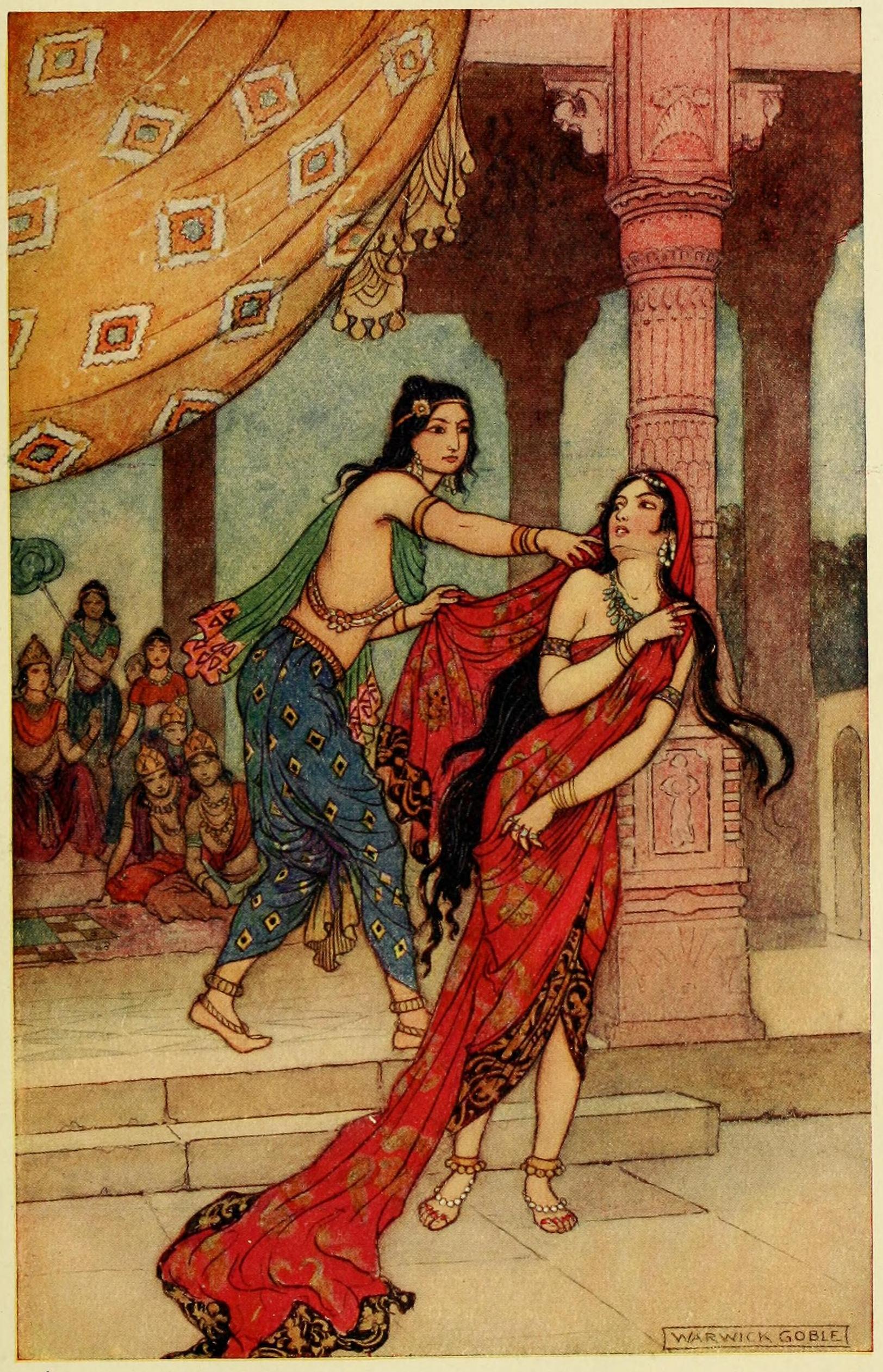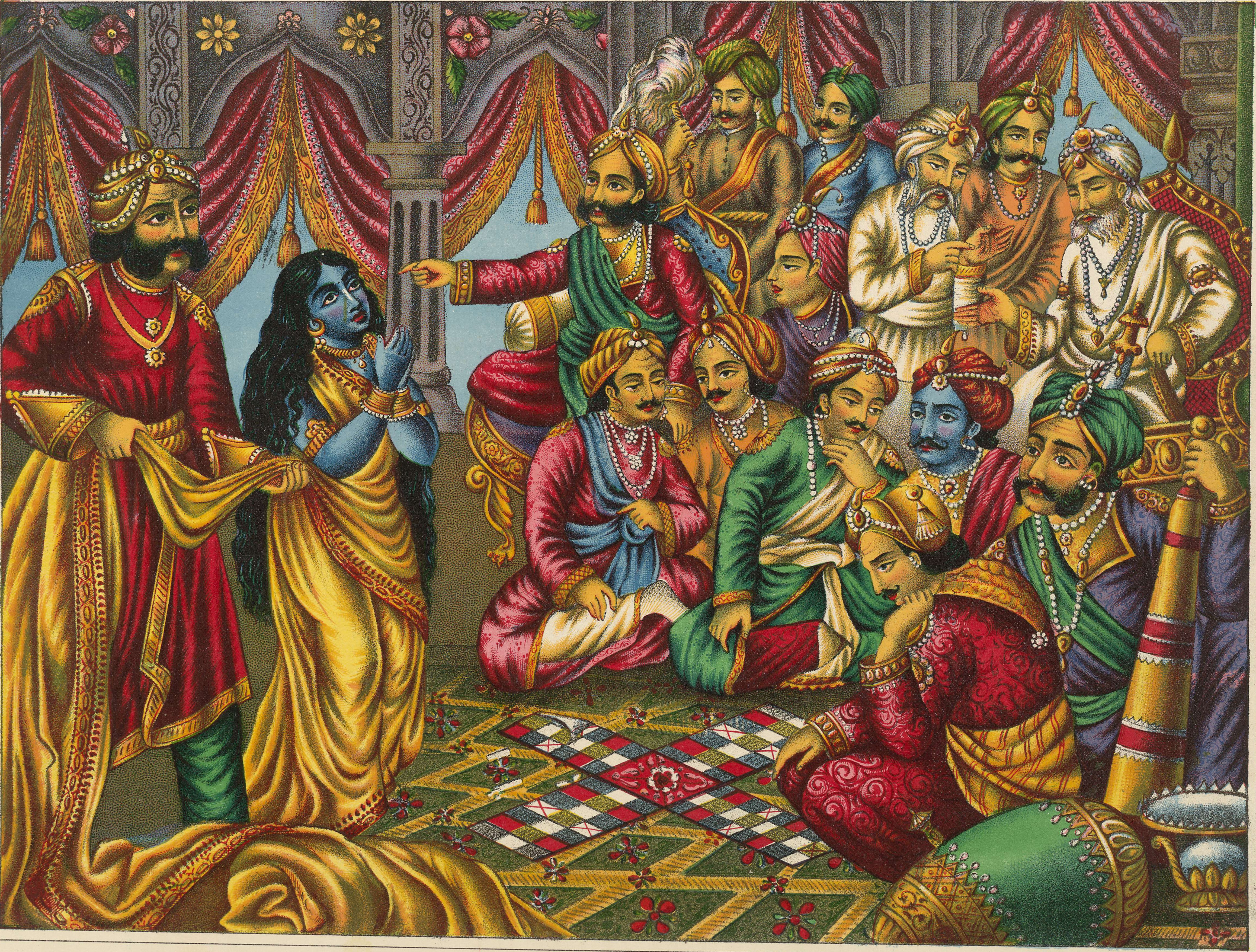Dussasana on:
[Wikipedia]
[Google]
[Amazon]
Dushasana ( sa, दुःशासन, , ), also spelled Duhshasana, Dussasana or Duhsasana, also known as Sushasana, is an antagonist in the
 After
After 

Hindu epic Mahākāvya (lit. great kāvya, court epic), also known as ''sargabandha'', is a genre of Indian epic poetry in Classical Sanskrit. The genre is characterised by ornate and elaborate descriptions of scenery, love, battles and so on — in short, eve ...
''Mahabharata
The ''Mahābhārata'' ( ; sa, महाभारतम्, ', ) is one of the two major Sanskrit literature, Sanskrit Indian epic poetry, epics of ancient India in Hinduism, the other being the ''Ramayana, Rāmāyaṇa''. It narrates the s ...
''. He was second eldest among the Kaurava
''Kaurava'' is a Sanskrit term which refers to descendants of Kuru, a legendary king of India who is the ancestor of many of the characters of the epic ''Mahabharata''. Usually, the term is used for the 100 sons of King Dhritarashtra and his wi ...
princes and the younger brother of Duryodhana. Dushasan's jealousy and herd mentality were the two qualities said to have led to his downfall in the Mahabharata.
Etymology
His name derives from the Sanskrit words ''duḥ-'' "hard" and ''śāsana'' "rule"; thus ''duḥśāsana'' means "ne who is
NE, Ne or ne may refer to:
Arts and entertainment
* Neutral Evil, an alignment in the American role-playing game ''Dungeons & Dragons''
* New Edition, an American vocal group
* Nicomachean Ethics, a collection of ten books by Greek philosopher A ...
hard to rule."
Birth and early life
WhenDhritarashtra
Dhritarashtra ( sa, धृतराष्ट्र, ISO-15919: Dhr̥tarāṣṭra) was a Kuru king, and the father of the Kauravas in the Hindu epic ''Mahabharata''. He was the King of the Kuru Kingdom, with its capital at Hastinapura. He was ...
's queen Gandhari's pregnancy continued for an unusually long time, she beat her womb in frustration and out of jealousy towards Kunti, the wife of Pandu, who had just given birth to Yudhishthira
''Yudhishthira'' (Sanskrit: युधिष्ठिर, IAST: ''Yudhiṣṭhira'') is the eldest among the five Pandava brothers. He is mentioned in the ancient epic Mahabharata. He was sired by King Pandu of the Kuru Dynasty and his firs ...
(the eldest of the five Pandava
The Pandavas (Sanskrit: पाण्डव, IAST: Pāṇḍava) refers to the five legendary brothers— Yudhishthira, Bhima, Arjuna, Nakula and Sahadeva—who are the central characters of the Hindu epic ''Mahabharata''. They are acknowledge ...
brothers). At this, a hardened mass of grey-coloured flesh emerged from her womb. Gandhari was devastated and called upon Vyasa
Krishna Dvaipayana ( sa, कृष्णद्वैपायन, Kṛṣṇadvaipāyana), better known as Vyasa (; sa, व्यासः, Vyāsaḥ, compiler) or Vedavyasa (वेदव्यासः, ''Veda-vyāsaḥ'', "the one who cl ...
, the great sage who had prophesied she would give birth to one hundred sons, to redeem his words.
Vyasa divided the ball of flesh into one hundred equal pieces, each piece no bigger than a thumb. He put them in pots of milk
Milk is a white liquid food produced by the mammary glands of mammals. It is the primary source of nutrition for young mammals (including breastfed human infants) before they are able to digest solid food. Immune factors and immune-modula ...
, which were sealed and buried in the earth for two years. At the end of the second year, the first pot was opened and Duryodhana emerged. Within a period of one month all the other 99 sons of Dhritarashtra were born. Dushasana was the second after Duryodhana.
Dushasana was devoted to his older brother Duryodhana. He (along with Duryodhana and Shakuni) was very closely involved in the various schemes and plots to kill the Pandavas
The Pandavas (Sanskrit: पाण्डव, IAST: Pāṇḍava) refers to the five legendary brothers— Yudhishthira, Bhima, Arjuna, Nakula and Sahadeva—who are the central characters of the Hindu epic ''Mahabharata''. They are acknowledge ...
.
Draupadi's humiliation
 After
After Yudhishthira
''Yudhishthira'' (Sanskrit: युधिष्ठिर, IAST: ''Yudhiṣṭhira'') is the eldest among the five Pandava brothers. He is mentioned in the ancient epic Mahabharata. He was sired by King Pandu of the Kuru Dynasty and his firs ...
lost a game of dice with Shakuni — losing first his kingdom, then his brothers and his wife Draupadi — Dushasana, at the behest of his brother Duryodhana, dragged Draupadi by the hair into the assembly and tried to disrobe her. Draupadi prayed to Krishna
Krishna (; sa, कृष्ण ) is a major deity in Hinduism. He is worshipped as the eighth avatar of Vishnu and also as the Supreme god in his own right. He is the god of protection, compassion, tenderness, and love; and is one ...
, who made her sari
A sari (sometimes also saree or shari)The name of the garment in various regional languages include:
* as, শাৰী, xārī, translit-std=ISO
* bn, শাড়ি, śāṛi, translit-std=ISO
* gu, સાડી, sāḍī, translit-std ...
to be of an infinite length so that Dushasana could not take it off. The assembled men were amazed at this miracle. They condemned Dushasana and praised Draupadi. However, Draupadi was humiliated at being dragged into court by her hair, and swore that she would never again tie up her hair until it was washed in Dushasana's blood. Then Bhima, who could no longer watch Draupadi's insult in silence, arose. He vowed to tear open Dushasana's chest in battle and drink his blood. Bhima also exclaimed that if he could not fulfill his oath, then he would not meet his ancestors in heaven.

Kurukshetra war and Death
Dushasana played an important role in Kurukshetra War and fought many warriors. On the first day of war, Dushasana was the first one to shot the first arrow. He fought a fierce battle withNakula
In the Hindu epic Mahabharata, ''Nakula'' (Sanskrit: नकुल) was fourth of the five Pandava brothers. Nakula and Sahadeva were twins blessed to Madri, by Ashwini Kumaras, the divine physicians. Their parents Pandu and Madri - died e ...
and later with Yudhishthira
''Yudhishthira'' (Sanskrit: युधिष्ठिर, IAST: ''Yudhiṣṭhira'') is the eldest among the five Pandava brothers. He is mentioned in the ancient epic Mahabharata. He was sired by King Pandu of the Kuru Dynasty and his firs ...
and was defeated by them.
On the second day of war, Dushasana killed Nakula
In the Hindu epic Mahabharata, ''Nakula'' (Sanskrit: नकुल) was fourth of the five Pandava brothers. Nakula and Sahadeva were twins blessed to Madri, by Ashwini Kumaras, the divine physicians. Their parents Pandu and Madri - died e ...
’s bodyguards. An angry Nakula defeated and nearly killed Dushasana in a sword fight.
On the 10th day of war, Dushasana attacked and injured Shikhandi
Shikhandi ( sa, शिखण्डी, translit=Śikhaṇḍī) is a character in the Hindu epic Mahabharata. Born as the daughter of Drupada, the King of Panchala, Shikhandi becomes a biological male after agreeing to a sex exchange with a y ...
in order to save Bhishma.
On the 13th day of war, Dushasana was among the powerful warriors who brutally murdered Abhimanyu. Abhimanyu badly injured Dushasana. Later, his son Drumasena killed Abhimanyu.
On the 14th day, Dushasana tried to stop Arjuna from reaching to
Jayadratha but defeated by him in a small archery duel.
During the night war, Dushasana defeated and killed Virata
Virata ( sa, विराट, IAST ''virāṭa''), was the king of the Matsya Kingdom, in whose court the Pandavas spent a year in concealment during their exile. Virata was married to Queen Sudeshna and was the father of Prince Uttara and Pr ...
’s bodyguards.
On the 16th day of the Kurukshetra War, Dushasana killed Magadha
Magadha was a region and one of the sixteen sa, script=Latn, Mahajanapadas, label=none, lit=Great Kingdoms of the Second Urbanization (600–200 BCE) in what is now south Bihar (before expansion) at the eastern Ganges Plain. Magadha was ruled ...
’s minister Vrihanta. Bhima fought with Dushasana in a mace war and beat him. When Dushasana was unable to fight Bhima uprooted both the arms of Dushasana. Then he took out his armour, tore his chest using his bare hands and killed Dushasana. Dushasana’s death was the most brutal death in the entire epic. To fulfill his oath, Bhima drank the blood from Dushasana’s open chest. The soldiers who witnessed this brutal scene fainted, thinking of Bhima as a monster. All the Kaurava
''Kaurava'' is a Sanskrit term which refers to descendants of Kuru, a legendary king of India who is the ancestor of many of the characters of the epic ''Mahabharata''. Usually, the term is used for the 100 sons of King Dhritarashtra and his wi ...
supporting warriors were highly disturbed by this scene. Bhima collected Dushasana’s blood and washed Draupadi’s open hair so that she could fulfill her oath of not tying her hair until they are not washed by Dushasana’s blood.

References
External links
* {{HinduMythology Characters in the Mahabharata